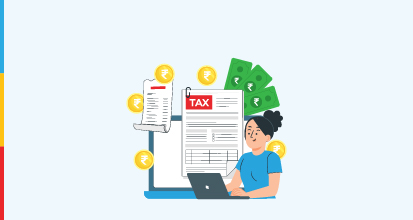2025-06-08
910 Views
4 minutes read
Share
The Government of India collects several crores in taxes every year. These collections are used to undertake development projects to help boost the country’s economy and improve the standards of living of the citizens. Tax payments benefit the payers on multiple levels- from improving infrastructure to supporting the society, and promoting general welfare activities.
We tend to spend our income on various services and goods that enhance our quality of life, and each of these spendings attracts taxes that add to our expenses. To ease the financial burden, the government provides the option of income tax savings through waivers, refunds, and rebates on taxes levied on our income and spending.
Taxes in India can be categorised into 2 types – Direct Taxes and Indirect Taxes, which are further subdivided into other types. Let’s define each type of tax in brief:
The products/ services excluded under GST are electricity, petroleum products, and alcoholic drinks, as these are still taxed as per the previous tax regime of the respective state governments.
An OTP has been sent to your mobile number

Sorry! No records Found
Thank you for your interest in our product. Our financial expert will connect with you shortly to help you choose the best plan.
Hiding or giving false income details is called tax evasion. But using the exemptions, deductions, and incentives allowed under the Income Tax Act is a legal way to reduce your tax. This is called tax planning, and it helps you save by making full use of the benefits available.
Some of the popular tax benefits include:
A salaried individual or pensioner can avail of a standard deduction of ₹50,000 under the old tax regime, while under the new tax regime, the deduction is enhanced to ₹75,000
By compliance with the conditions stated in Chapter VI A of the Income Tax Act, companies can get a number of tax benefits
Selling a long-term asset possession can get you exemption from the Capital Gain Tax if the profit amount is re-invested in specified instruments
Deduction of up to ₹1,50,000 can be availed for investments in tax-saving insurance plans under Section 80C of the Income Tax Act.
A deduction of ₹50,000 can be claimed by persons of 60 years or more on interest earned on FDs under section 80TTB.
Under Section 80E, an individual can claim a deduction on the entire interest paid on an education loan for up to 8 years, or until the interest is fully repaid, whichever is earlier
There are a number of other benefits provided under the Income Tax Act. All the above points can help one reduce their tax burden substantially for a stipulated financial year. Also, it is advised that you read carefully about the various provisions offered by the government to help you save taxes before making an investment or making a major purchase.
Disclaimer - This article is issued in the general public interest and meant for general information purposes only. The views expressed in this blog are solely those of the writer and do not necessarily reflect the official policy or position of Canara HSBC Life Insurance Company Limited or any affiliated entity. We make no representations or warranties of any kind, express or implied, about the completeness, accuracy, reliability, suitability, or availability with respect to the blog or the information, products, services, or related graphics contained in the blog for any purpose. Any reliance you place on such information is therefore strictly at your own risk. You should consult with a qualified professional regarding your specific circumstances before taking any action based on the content provided herein.
We bring you a collection of popular Canara HSBC life insurance plans. Forget the dusty brochures and endless offline visits! Dive into the features of our top-selling online insurance plans and buy the one that meets your goals and requirements. You and your wallet will be thankful in the future as we brighten up your financial future with these plans.








